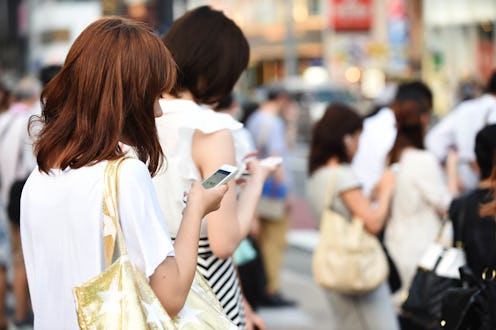Fashion
Don't Judge People Based On This Accessory, Or Any
In 2006, the coolest cell phone was the Motorola Razr. Remember that? There was a girl in my sixth grade class who had the bubblegum pink version. She texted all the time — even sending pictures! — and I was so jealous. (I didn't get a cell phone until halfway through freshman year of high school; the envy was strong and enduring.) The mid-2000s was also when Yahoo instant messaging was the way to communicate online. Now I raise my eyebrows whenever someone emails me from a Yahoo address, like, "Seriously? Don't you love yourself?" Granted, I haven't actually used Yahoo in a long time, so maybe I'm being too harsh.
Simon Hill writes on Digital Trends, "The Motorola Razr was the first cell phone that... kindled some desire." On tech blog The Verge, David Pierce recalls that when the Razr came out, it cost $449, "a price virtually unheard of. Reviewers called it a fashion item, a curiosity." Pierce goes on to explain, "Motorola proved that people would pay good money for great hardware... Motorola was the first company to prove design could sell a cellphone, and for three years, an eternity in the consumer electronics world, it couldn't be stopped." In other words, Motorola established the cell phone as a luxury item, a "must-have" not only for functional reasons, but for the sake of keeping up with the Joneses.
Now the phone that rules the world is Steve Jobs' creation, the iPhone. People consider the iPhone to be the premium smartphone, which delights Apple. Runner up: Probably the Samsung Galaxy S5. However, at least in the U.S., no Android phone has the special cachet of an iPhone.
Describing the consumer reaction to "green bubbles," a.k.a. non-iPhone text messages, Paul Ford writes on Medium, "If I worked at Apple I'd be pretty psyched... what is a more powerful brand amplifier than social pressure? If people who converse in green bubbles start to feel relatively poor, or socially inferior, because they chose to use a less-expensive pocket supercomputer than those made by Apple, that could lead to iPhone sales." He finishes the article by scolding Apple:
"I mean, why not let the people who can't afford your products have a nice shade of green — fern or pear, pickle or pistachio, maybe even sea-foam, instead of something that looks like glow-stick at a rave? They'll still feel poor, I promise. It's probably one line of code to change the color, to reduce the tension between the blues and the greens, to make it possible for a broke dude stuck on Android 4.1 Jelly Bean to mack on a rich girl with an iPhone 6 without her knowing that he's not in the same ecosystem. Why be so petty, Apple? In any case, I'm sticking with Android."
There's a pang of guilt, because I know that I'm being somewhat elitist, but I don't want an Android device. I have significant brand loyalty to Apple. In my experience, the iPhone user experience is unparalleled. It's a beautiful device — clean design inside and out. (Not everyone agrees on this point, like the one dude who enjoys his Windows phone.) Crucially, the iPhone is cool. Although I'm technically a grownup, I am still susceptible to trends — to the allure of expensive things.
I must remember, when I'm tempted to judge someone for having an HTC phone or an old Nokia clunker: Being able to buy an iPhone comes from privilege. Who can afford to drop $700 on a phone? Even with the contract discounts, iPhones are expensive. The only reason I have an iPhone is that I was due for an upgrade not long after the 5S came out, and my parents pay for my phone anyway. Otherwise I would have a monthly burner and make fun of people with iPhones as a self-defense mechanism.
Zen blogger Leo Babauta admonishes us, "Yesterday, without the new iPhone, your life was good. Some of you were happy and content and were actually able to do your work and get on with your life without the new iPhone." The yearning arises when "Apple announces its newest device, and the press and tech bloggers swoon. We all have to get the latest device, or we'll no longer be hip, we'll no longer be part of the 'in' crowd." Babauta advises, "Find contentment without products. You're better than that."
I don't plan to give up my iPhone. It's an incredibly useful little device, and otherwise what would I put in that pocket of my purse? I do plan to be more careful in my judgments based on conspicuous consumption. It's petty and ludicrous to dismiss people with Android phones, just because they have Android phones. I don't laugh at people who drive crummy cars — I drive a beat up 2001 Toyota Corolla, so that would be hypocritical. Despite headlines like "GOOGLE'S DIRTY SECRET: Android Phones Are Basically Used As Dumbphones" and "Android Is Popular Because It's Cheap, Not Because It's Good," I'll shrug say, "It's just a phone." We all know that it's never "just a phone," but maybe it should be.
Images: Getty
